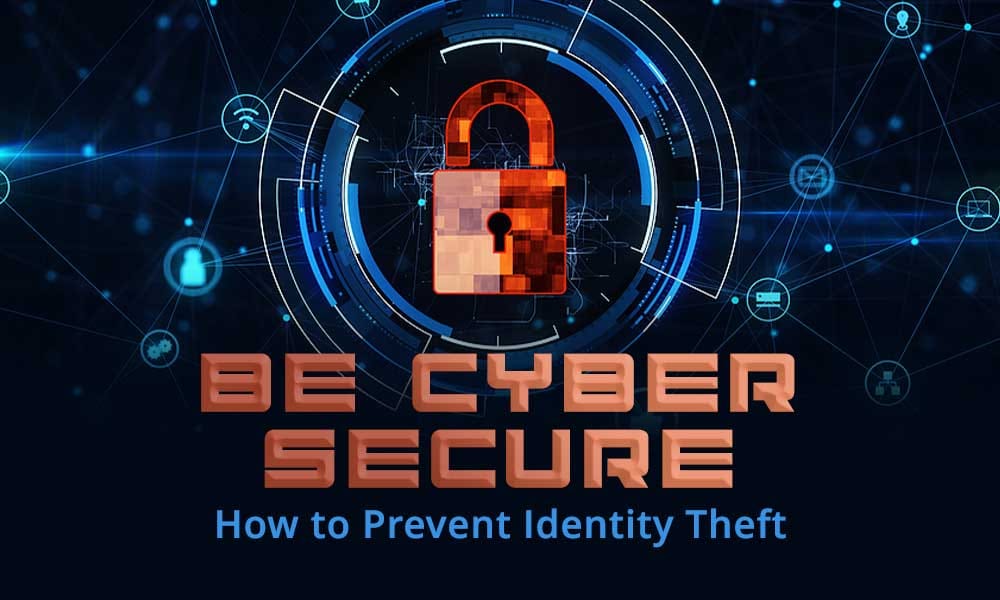From online banking and shopping to social media and email, have you ever stopped to think about the trail of personal information you leave behind hourly every day?
In today’s interconnected world, our digital footprint is constantly expanding. And, in the wrong hands, these breadcrumbs of information can lead to devastating results, like fraud and identity theft.
If we haven’t fallen prey to cyber criminals, we all have a friend or family member who has been a victim. These online thieves are becoming more sophisticated each moment, making it crucial to be proactive about our online security.
Here are some practical steps to help you protect yourself and minimize cyber risks.
Understand the Threat
Identity theft occurs when someone steals your personal information, including your Social Security number, bank account details, or your driver’s license number, to commit fraud. They might open new accounts in your name, make unauthorized purchases, or even file fraudulent tax returns. The damage can be significant, impacting your credit score, finances, and reputation.
Be Defensive
While you can’t eliminate the risk, you can reduce it by implementing these strategies:
- Strengthen Your Passwords: This is the first line of defense. Use a unique, complex password for each of your online accounts. A strong password should be a combination of uppercase and lowercase letters, numbers, and symbols. Consider using a password manager to securely store and manage your passwords. Avoid using easily guessable information like your birthday or pet’s name.
- Be Wary of Phishing: Phishing emails, text messages, and phone calls are designed to trick you into revealing personal information. Be suspicious of unsolicited communication asking for sensitive data, especially if it creates a sense of urgency. Legitimate organizations rarely request personal information be sent to them through email or text. Never click on links or open attachments from unknown senders. Instead, navigate directly to the organization’s website to access your account.
- Secure Your Devices: Keep your computer, smartphone, and tablet updated with the latest security software. Install reputable antivirus and anti-malware programs and run regular scans. Enable two-factor authentication whenever possible, adding an extra layer of security to your accounts. This usually involves receiving a code on your phone or email to verify your login.
- Protect Your Wi-Fi: Secure your home Wi-Fi with a strong password and encryption. Avoid using public Wi-Fi for activities like banking or shopping, as these networks are often unsecured and can be easily compromised.
- Monitor Your Credit Reports: Regularly review your credit reports from all three major credit bureaus (Equifax, Experian, and TransUnion) to identify suspicious activity. Look for unauthorized accounts, inquiries, or changes to your personal information. You can obtain a free copy of your credit report from each bureau annually at AnnualCreditReport.com.
- Be Mindful of Social Media: Limit the personal information you share on social media platforms. Avoid posting your address, phone number, or other sensitive details. Be cautious about accepting friend requests from strangers and review your privacy settings regularly.
- Shred Sensitive Documents: Before discarding documents containing personal information, such as bank statements, credit card bills, or tax returns, shred them thoroughly. A cross-cut shredder is recommended for maximum security.
- Stay Informed: Keep up to date on the latest cyber threats and best practices. Follow reputable blogs and news websites to stay informed about scams.
If you believe you have been a victim of identity theft, act quickly. Contact the affected financial institutions, credit bureaus, and law enforcement agencies immediately. File a police report and keep a record of all communication and actions taken.
Protecting yourself from identity theft is an ongoing process, and the idea of cybersecurity can feel overwhelming. The good news? By staying vigilant and implementing these preventative measures, you can significantly reduce your risk and safeguard your personal information. And, if you are worried you might be a victim, simply reply to this email and we can help.
Remember, being cyber secure is not just a good idea – it’s a necessity.

